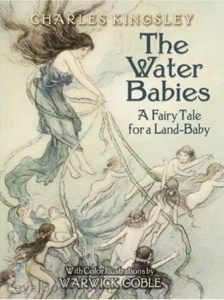Charles Kingsley
Listen to the Recess! Clip
| Author | Rita Smith |
| Air Date | 6/21/2001 |

Charles Kingsley Transcript
Charles Kingsley’s reputation in the world of children’s literature rests almost solely on his novel Water Babies, which, along with Lewis Carroll’s Alice in Wonderland, is generally regarded as heralding the Golden Age of children’s literature.
The Water Babies is the story of Tom, a ten-year old chimney-sweep. One day Tom accompanies his cruel master to a grand house to clean the chimneys. He gets lost among the maze of chimneys and comes down one into the bedroom of a little girl, Ellie, who is asleep on the bed. Tom is amazed by the room’s cleanliness and, seeing his reflection in a mirror, is appalled by his own filthiness. He is discovered in the room and is chased over moors by the owner of the house and his servants. Tom scrambles down a cliff to a valley where he submerges himself in the stream. A “black thing” is recovered from the river and buried in the local cemetery, and Tom evolves into a water baby. Through his adventures under water he learns the meaning of altruism and selflessness and eventually, by an act of Christian charity, he proves himself thoroughly cleansed. Here Kingsley, forgetting that Tom is dead and buried in a neighborhood cemetery, brings him back to earthly life and makes of him a great man of science.
Although one critic suggests that the book treats important intellectual questions and provides a good introduction for thoughtful children to “diverse aspects of the Victorian Age,”1 most critics agree that the book is flawed by the constant intrusion of the author himself. As soon as Tom submerges himself in the river, the lively narrative ends and the lecturing begins, which makes the last 4/5 of the book almost unreadable, particularly to children. Kingsley writes long digressions, espousing his ideas on sanitation, exploited children, redemption through nature, the stupidity of academics and intellectuals, and the vileness of cheap candy. A pervasive theme of the book is the urgent need for young readers to develop proper sanitary habits. One critic notes, “Kingsley actually saw in water, preferably cold water, a moral agent …being convinced that if a boy took a cold bath every morning moral rectitude was bound to result.”2 His obsession with cleanliness and his belief in redemption through the natural world is revealed in his extensive use of water throughout the story, and at the end of the book Kingsley admonishes his child readers to “learn your lessons and thank God that you have plenty of cold water to wash in.”
1 Leavis, Q.D., quoted in Brendan A. Rapple, “Charles Kingsley,” Dictionary of Literary Biography, v. 163: British Children’s Writers, 1800-1880. A Bruccoli Clark Layman Book. Edited by Meena Khorana, Morgan State University. The Gale Group, 1996, pp. 136-147.
2 Chitty, ? , quoted in Rapple.